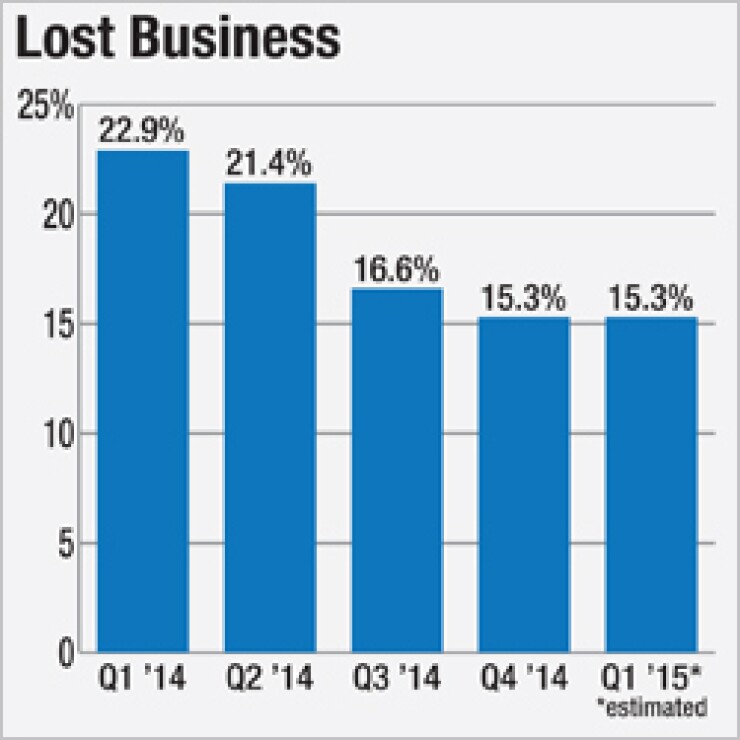

The Federal Housing Administration is looking to catch a mortgage refi wave swelling on the horizon, even as some servicers prepare to get drenched.
Certain servicers may have to take writedowns in the first and second quarters if FHA loans are refinanced in large numbers as expected. The FHA itself could benefit from the boom if servicers refinance more borrowers back into FHA-- and the incentive for them to do so is now greater.
Mortgage servicers, brokers and bankers are
"For those servicers with elevated FHA exposure, we would expect elevated amortization expenses or fair value marks," said Kevin Barker, an analyst at Compass Point Research & Trading.
All servicers are desperately trying to keep borrowers who want to refinance from flying out of their own portfolio to another servicer's. FHA loans in particular are attractive because the servicer is paid about 44 basis points of the loan balance each year . The FHA pays servicers more than Fannie Mae and Freddie Mac, which back conventional loans. Why? The cost of handling FHA loans is higher as the agency caters to first-time and low-to-moderate income homebuyers who typically have higher defaults.
The challenge for servicers is that when interest rates drop, more borrowers refinance. The underlying value of the mortgage servicing right falls since borrowers are paying off their loans and moving out of the portfolio. Servicers do not want to lose the reliable servicing income stream.
So far, California borrowers with FHA loans above $300,000 are the only ones that are currently prepaying in droves, said Azad Rafat, a managing director of mortgage-servicing analytics and valuations at Capital Markets Cooperative in Ponte Vedra Beach, Fla. But prepayments are expected to increase in the next few months, assuming interest rates remain low.
Some FHA servicers are experiencing anywhere between 15% and 20% prepayments just in California, Rafat said. He expects overall FHA prepayments of 17% to 22%, with most coming from borrowers refinancing in Western states.
"It will hit some servicers really hard," Rafat said.
Large bank servicers hedge their portfolios, so the impact on the biggest FHA servicers like Wells Fargo, JPMorgan Chase and Bank of America is expected to be limited, analysts said.
Nonbank servicers such as Nationstar Mortgage in Lewisville, Texas, and Walter Investment in Tampa, Fla., already took fourth-quarter writedowns because of hedging issues and higher overall prepayments on a wide range of loans.
Stonegate Mortgage, an Indianapolis FHA lender and servicer, took a $32.3 million loss in the fourth quarter as it revalued its mortgage-servicing rights.
"There's a lot of FHA paper out there in the market that we're targeting for refinance," Stonegate's CEO Jim Cutillo told analysts on a Feb. 27 conference call. "Almost half of our portfolio is Ginnie Mae, and so we've been very successful in going to those, especially with the [mortgage insurance premium] drop."
There will still be some sting for the FHA, too.
It is expected to bring in less revenue because of the 50-basis-point drop in premiums announced in January. With lower premiums, the FHA will take longer to rebuild its capital reserve, which has been chronically underfunded since 2009. The FHA's capital reserve is now at 0.41%, below the 2% mandated by Congress. The FHA is now projected to hit that 2% mandated buffer in 2016, angering some members of Congress.
The 2% capital reserve comes on top of the FHA's annual reserves that are set aside to cover projected losses in its book of business over 30 years. A spokesman for the Department of Housing and Urban Development, which oversees FHA, declined to project how FHA's premium reduction might affect future volume.
Yet the FHA could benefit from the drop in annual premiums if servicers are able to recapture borrowers by refinancing them back into FHA loans. FHA's recapture rates exceeded 70% in 2011 and were above 60% in 2013. But after the agency raised annual mortgage insurance premiums to 135 basis points in 2013, recapture rates have plummeted to as low as 15% in the fourth quarter of 2014.
The FHA reduced annual premiums primarily to improve access to credit and lower the cost of buying a home for first-time and lower-income borrowers. But another important reason was that loans were running off too quickly.
"Lowering the premiums is a good thing because it prevents runoff, and [FHA was] losing a big income stream because of prepayments," said Brian Chappelle, a partner at Potomac Partners, a Washington D.C. consulting firm.
Just 8% of FHA loans were originated from 2005 to 2008, the years with the highest defaults during the financial crisis, Chappelle said. But 86% of FHA loans are of higher quality, having been originated after 2009, he said. In addition, FHA will benefit from borrowers that do a streamlined refinance back to FHA because they pay a 175-basis-point, up-front insurance premium, which averages about $3,500 on a $200,000 loan.
"They have a high preponderance of high-quality loans, and they are charging many of those borrowers some of the highest premiums in history," Chappelle said.




